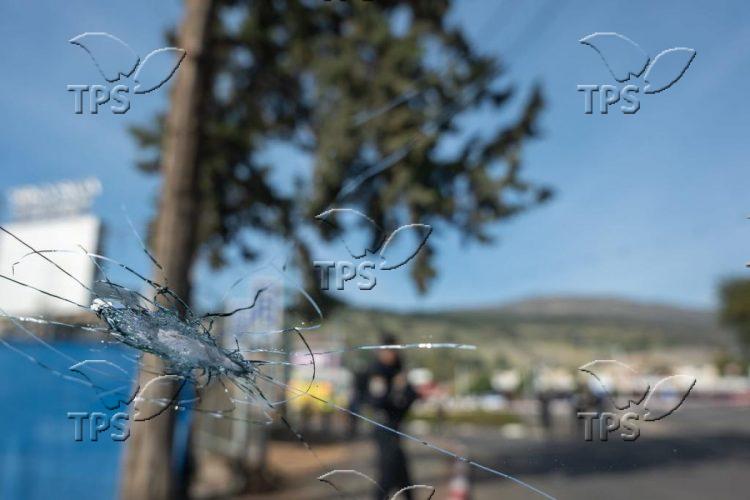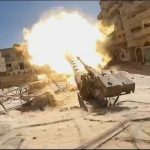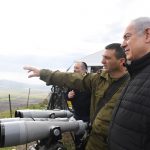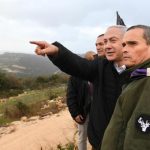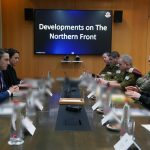In Evacuated Northern Kibbutz, Signs of Hezbollah Abound
Jerusalem, 24 January, 2024 (TPS) -- Founded in 1916, Kfar Giladi is one of Israel’s oldest kibbutzim. Located less than a mile from the Lebanese village of Odaisseh, it is currently evacuated. Nisan Levi is a member of the kibbutz’s local security squad.
“If Israel does not address the threat Hezbollah poses, residents of northern Israel are at risk of another murderous invasion similar to Hamas’s Oct. 7 attack,” Levi told the Tazpit Press Service.
“On Oct. 7, we woke up to the horrors of Hamas’s massacre and were certain that Hezbollah would infiltrate Israel,” he explained.
Instead, the Lebanon-based Iranian terror proxy launched a low-intensity campaign against the Jewish state, firing rockets, drones and anti-tank missiles at northern communities on a near-daily basis.
As part of his duties, Levi patrols the border to assure the security of agricultural workers still tending to the fields.
“We know the region and the surroundings better than anyone else, we all served in special units in the army,” he said, referring to the other members of the security team. “We’re facing all kinds of threats, all made in Iran and sent to Hezbollah to hurt us.”
Hezbollah and other terror factions in Lebanon have since Oct. 7 targeted Israel more than 600 times, claiming the lives of six civilians and nine soldiers. Some 130 Hezbollah terrorists have been eliminated in retaliatory strikes.
As a result, some 80,000 residents of 42 northern Israeli communities have been forced to leave their homes.
“Residents of the north became refugees in their own country,” said Levi.
To raise awareness of their plight, Levi has brought Knesset members and journalists on tours of the area.
“We will not come back as long as Hezbollah poses a threat to us. If we don’t come back, it will be known as the biggest political failure in the history of Israel,” said Levi.
A study published this month by the Tel-Hai Academic College and East Galilee communities found that more than half of the residents of the north are unwilling to return to their homes.
“The Oct. 7 massacre was a wake-up call. We want to make sure that no one sells us fake realities or a false sense of security the way they did to the residents of the south,” said Levi.
On Tuesday, Israeli Prime Minister Benjamin Netanyahu met with two dozen local and regional council heads from the north, together with other members of the War Cabinet. Six other high-ranking ministers were also in attendance as council heads detailed the needs of residents and evacuees.
Almost simultaneously, Hezbollah attacked an Israel Air Force air traffic control base on Mount Meron in the Upper Galilee for the second time this month. Twelve rockets were fired at the sensitive Meron air traffic control installation, four of which were intercepted and the remainder of which fell in open areas.
The attack came amid White House envoy Amos Hochstein’s continued diplomatic efforts to negotiate a deal that would see Hezbollah withdraw its terror forces several miles from the border.
According to Levi, such efforts are a waste of time.
“Lebanon is a failed state. There is no one to negotiate with. Those who tried, including Hochstein, know it,” he said.
Levi has therefore established Lobby 1701, representing the tens of thousands of evacuees and calling for Washington to back a military operation to distance Hezbollah from the border.
The initiative is named for U.N. Security Council Resolution 1701, which was ratified by Beirut and Jerusalem following the 2006 Second Lebanon War. The resolution stipulates that Hezbollah is not allowed to operate south of the Litani River, 18 miles north of the Israel-Lebanon frontier, and also calls for the terror group to be disarmed.
“It is now clear that the United Nations Interim Force in Lebanon [UNIFIL] and its 11,000 soldiers failed to implement Resolution 1701. Between 2006 and 2023, Hezbollah rearmed and has now positioned itself on the border,” said Levi.
Hezbollah possesses an estimated arsenal of 150,000 missiles of all ranges, and has an active-duty force of some 25,000 fighters, many of whom are veterans of the wars in Syria, Afghanistan and Iraq.
The combined force is believed to have plans to invade and occupy large swaths of the Upper Galilee and destroy strategic installations across Israel, while inflicting tens of thousands of casualties.
“Whichever diplomatic solution the government comes up with will be a failure, exactly as Resolution 1701 was,” said Levi.
Accordingly, Lobby 1701 last month wrote a letter to the U.S. administration calling on Washington to “give its full support to the government of Israel to act with the necessary force and means to promise our safety and security.”
The letter came amid reports indicating that U.S. President Joe Biden was putting pressure on Israel to avoid escalation in the north.
“We represent 80,000 Israeli citizens who have lost trust in diplomatic solutions and who will not accept a partial solution,” said Levi. “Hezbollah, the biggest terror organization in the world, is now located at our doorstep, with terrorists openly claiming that their intention is to kill us. We won’t take a chance.”
He continued: “We will make sure that the prime minister and the War Cabinet understand our expectations. We will not be content with fences and smart cameras. We seek the creation of a buffer zone within which anyone trying to infiltrate will be immediately neutralized.”

